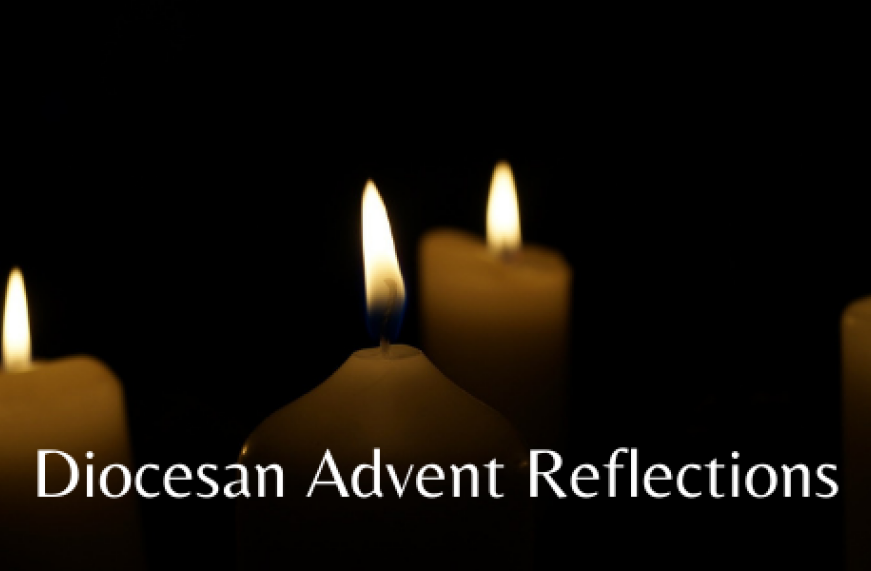Daily Advent Reflection: December 24

Christmas Eve
Dec 24 Morning: Psalms 45 & 46, Isa. 35:1-10 Rev. 22:12-17, 21 Luke 1:67-80
Dec. 24 Eve: Psalms 89:1-29, Isa. 59:15b-21, Phil. 2:5-11
To express our deepest pain and longing, we often leave behind measured sentences of prose and turn to the verses of poetry and song. In the midst of the political, economic and global-health chaos of this last year, many have been quoting the famous poem by W.B. Yeats, “The Second Coming:”
"Turning and turning in the widening gyre
The falcon cannot hear the falconer;
Things fall apart; the centre cannot hold."
Yeats wrote his poem shortly after the end of World War I, when so many were grieving their dead, grieving the loss of order and the notion of humanity’s steady upward progress. If war had laid bare humanity’s darkest impulses, what could be coming next?
"And what rough beast, its hour come round at last,
Slouches towards Bethlehem to be born?"
Two thousand years before Yeats, the gospel writer Luke sets out to tell the story of the One born in Bethlehem. The vast majority of the time he tells this story in prose, but in the very first chapter, the main characters break into poetic song, unspooling verses which have formed the church for centuries. Told that she carries the Messiah, Mary offers the poetry of the Magnificat. And just after her song, Luke records the song of Zechariah. Zechariah had been told that he would be a father late in life and that his child would one day help turn the hearts of people back to the Lord. Disbelieving this was possible, the Lord struck Zechariah dumb. And when his tongue is finally loosened poetry spills from his mouth.
Blessed be the Lord, the God of Israel; *
he has come to his people and set them free.
He promised to show mercy to our fathers *
and to remember his holy covenant.
Zechariah is familiar with ache and longing. He knew the excruciating pain of not being able to father a child, month after month, year after year. He knew political and economic pain and longing. Israel had been ransacked by one Middle Eastrn power after another, and Zechariah came of age with the boot of the Rome Empire pressed on the neck of the people. But God would remember. God would not give up on them. God would come to save.
We have come to a Christmas Eve, where normally there might be great celebration. This evening we should be watching sheep and costumed shepherds shuffle towards Bethlehem. We should be singing carols in candlelight and drinking from the heaviest chalice. We should be basking in the light and warmth of human fellowship. Many of us will do our best to have small celebrations, but this day will no doubt be full of longing. Our church building will spend much of this Christmas Eve in darkness.
The Song of Zechariah is written not only for those of us who wonder when we will return to church, but those who have known all kinds of darkness. Those who felt the center of our souls would not hold, forces of anxiety or addiction pulling us apart. Those who have recently buried loved ones with just the barest of liturgies. Those who now look for work. The darkness and uncertainty of deepening political division.
But Bethlehem is close. Into our longing, we have the promise that the center will hold, that God will not forsake us.
In the tender compassion of our God *
the dawn from on high shall break upon us,
To shine on those who dwell in darkness and the shadow of death, *
and to guide our feet into the way of peace.
I love the poetic contrast of God’s tender compassion breaking upon us, a wave of loving kindness crashing over us. I love the image of the Lord sending One who will guide our feet in the way of peace.
When so much feels so out of control, each of us can choose the song we sing. Will we add to the cries of fear and anxiety that the center will not hold? Or will we with our lips and with our lives sing into the darkness a song of God’s tender compassion breaking in around us? What will you sing this day?
The Rev. Seth Dietrich
Christ Episcopal Church, Whitefish Bay
